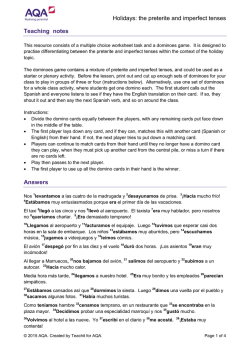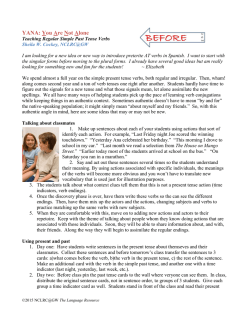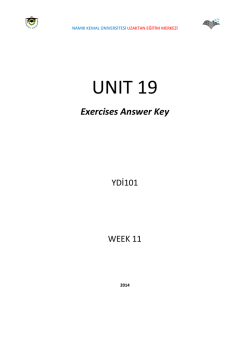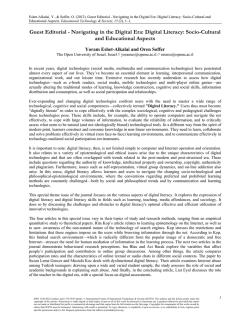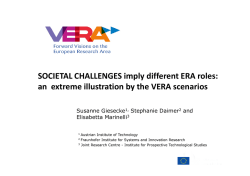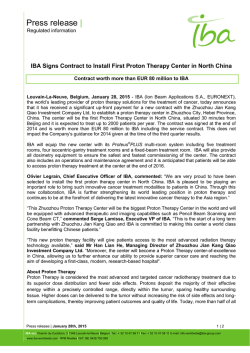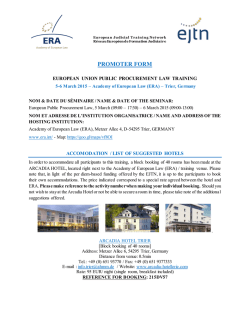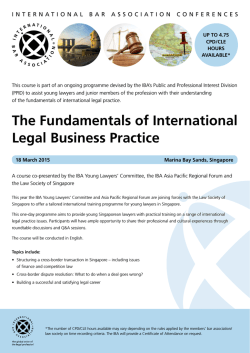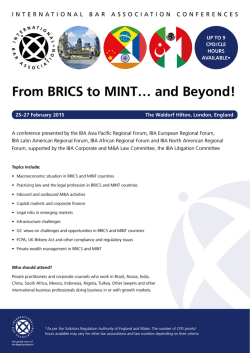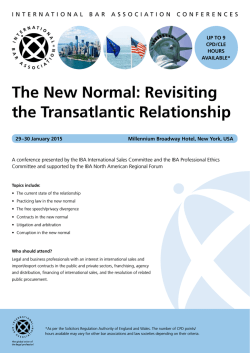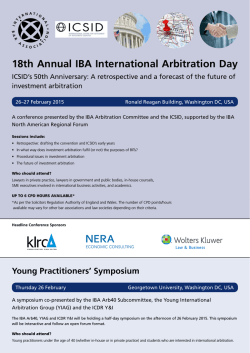
¿Cómo eras? - Ms. Torres
¿Cómo eras? Learning to talk about the past using the imperfect tense. The imperfect tense We use the imperfect tense when talking about cetains situations in the past: 1. When talking about what used to happen , or repeated actions e.g. I used to go to primary school Iba a la escuela primaria I ate chocolate every day Comia chocolate todos los días. 2. When describing incomplete actions: I was writing a letter Escribía una carta We were drinking beer Bebíamos cerveza 3. When describing things in the past: The lesson was boring La clase era aburrida. I was short and skinny Era baja y flaca. To form the imperfect tense follow this rule: Take the –ar, -er, -r –ir ending of the infinitive and add the following endings: comprar – to buy comer – to eat vivir – to live compraba comía vivía comías vivías comía vivía comíamos vivíamos You comprabais comíais vivíais They compraban comían vivían I You comprabas He/she/it compraba We comprábamos Quick test: Work out how to say: tenía 1. I used to have (tener) 2. She used to sing (cantar) cantaba 3. They used to write (escribir) escribían There are only 3 irregular verbs in the imperfect tense! Ir-To go iba I used to go ibas you used to go iba He/She/it used to go ibamos We used to go ibais You used to go iban They used to go Ser- to be era I used to be eras you used to be era He/She/It used to be éramos We used to be erais You used to be eran They used to be Ver- to see veía I used to see veías You used to see veía He/She/it used to see veíamos We used to see veíais you used to see veían They used to see Task 1: Underline all verbs in the imperfect tense. Task 2: Find the Spanish for: 1.When I was very young: _____________________________ 2. At the age of: _____________________________ Cuando era muy joven vivía con mis padres y mi hermano en una casa pequeña en Wellington. A la edad de cinco años, tenía el pelo largo, rubio y rizado y era bastante baja. En cuanto a mi personalidad, era feliz y habladora pero era muy timida, no me gustaba hablar con los adultos desconocidos, por ejemplo los amigos de mis padres. Siempre comía bocadillos de mermelada y bebía mucha leche. Todos los días iba al prescolar con mis amigos donde me gustaba jugar y cantar. Veía muchas programas de televisión, por ejemplo “The Wombles” y “ Chorlton and the Wheelies”. Ahora soy muy distinta; odio la mermelada y no me gusta cantar porque ¡ tengo una voz como un gato estrangulado! Ya no soy tímida, al contrario soy muy habladora. 3. As for my personality: _____________________________ 4. I didn’t like to talk: _____________________________ 5. Strange adults: _____________________________ 6. Always:_____________________ 7.Every day:___________________ 8. Write the two words for’now’: ______________ and _____ 9.On the contrary: _________________________________ Los deberes Adapt the passage you have just read and write 150 words about what you were like as a child. The title is “Cuando era muy joven”.Include the following: 1. At least ten different verbs in the imperfect tense. 2. Sentence extenders- use my passage and adapt it with phrases that make your writing more interesting such as ‘on the contrary’ and anything else you find on your vocab sheets. 3. Use a range of connectives (Por lo tanto, pero, y, además, desafortunadamente etc) 4. Like I have, include information at the end about how you have changed. 5. Most importantly, include a photograph of yourself (either glue it on your written work or attach it to a word document and print) and DO NOT put your name on the work- so that we can guess who is who after ½ term. Part 2 – Log onto vocab express and go to ‘Foundation Tier Topics’ ‘ Relationship and Choices’then learn BOTH sections ‘future plans etc’ and ‘Social issues and equality’ (All blocks) ready for when we come back after half term. Do not attempt to learn it all over just a few days- you should dedicate 15 mins a day in order to learn successfully.
© Copyright 2026
